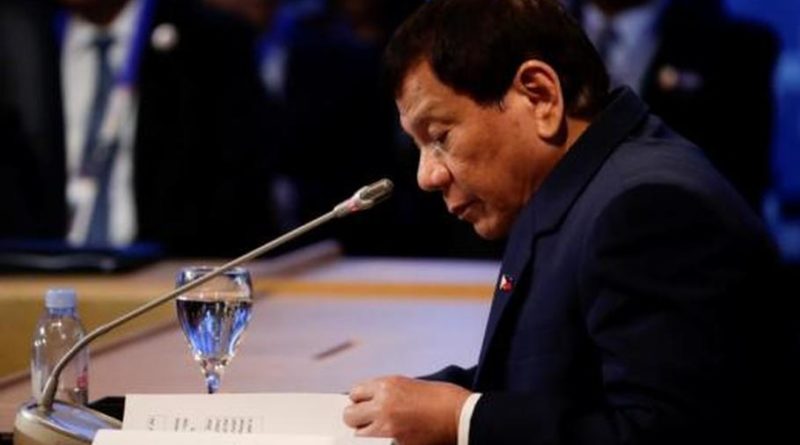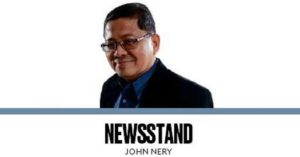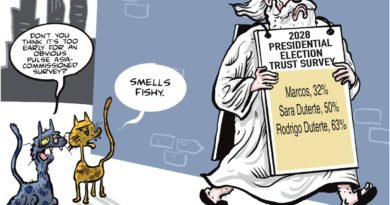OP-ED COLUMNISTS-OPINION: NEWSSTAND By John Nery – Digong has taken over the bus
Some readers, not all of them ill-intentioned, ask a common question: If you can still write whatever you want in your column, or the news sections and the op-ed pages can still run stories or opinion critical of President Duterte, what assault on press freedom are you talking about?
But attacks on press freedom are not a one-time, either-or event, like a car crash. The readers who ask the question think attacking press freedom is like a serious road accident: It happens once, and there’s blood on the street. But in reality, assaults on the free press are like riding a bus headed for, say, Naga (because that’s where Mayon Volcano apparently is), and in the middle of the route a new crew, including a new driver, takes over—and then the bus suddenly, violently, changes direction. Do the passengers need to wait until the bus stops in Imperial Manila or arrives in Paoay, Ilocos Norte, before demanding an explanation or correcting the course?
This metaphor sums up the state of press freedom in the Philippines today: A new driver has taken over the bus and is going the wrong way (he even calls press freedom a mere privilege, instead of a guaranteed right). Do the passengers wait until he loses his brakes or threatens to drive the bus off a cliff before they take action to protect themselves?
.
* * *
I had the honor of reading the keynote address at yesterday’s opening ceremony of the Department of Education’s long-running National Schools Press Conference. I took the opportunity to discuss the event’s theme—Asean integration, and the role of campus journalism in inclusive education—through the prism of Rizal’s “perpetually applicable advice.”
In his epic letter to the women of Malolos, Rizal listed seven words of wisdom. I focused on the first three as speaking to the role journalism helps play in a free society.
“First of all. The villainy of some lies in the cowardice and carelessness of others.”
“Second. One is oppressed because of the lack of love for one’s self and because of excess regard for the oppressor.”
“Third. Ignorance is slavery, because as a man thinks, so he is: a man without the capacity to think for himself is not human; the blind who follows the thought of others is like a beast who follows the rope that tethers him.”
I argued that we can “understand democracy very simply as ‘consent of the governed.’ The role of a free press is to help make that ‘informed consent.’ It is not real consent, as Rizal warns us, if we are merely following the rope that ties us. It is not informed consent if we merely accept someone else’s imposition of his will on our definitions of what is right and just. It is neither informed nor consensual if our intelligence is deceived by organized disinformation—the exact same evil Rizal warned us against. And it is not true governance if the governed are kept separate, rather than bound and strengthened as one.”
* * *
I did have three specific suggestions for the campus journalists.
One: “These bonds suggest an immediate—and perhaps for many previously unimagined—plan of action for our campus publications. We—you—should begin reporting and writing on our neighbors’ schools and students too. Visa-less travel and budget airlines make inter-Asean visits much more possible, but in fact there is no need to leave our own campuses. We can Skype interviews, talk in Google Hangouts, organize virtual campaigns on Twitter, share each other’s Instagram accounts.
“How can Asean integration work in the Philippines when in our own campus publications there is almost zero mention of Indonesian environmental activists, Thai business majors, Malaysian scholars working in Singaporean universities? We can begin changing that, if we commit to using our campus publications, especially our digital and mobile editions, not only as a microscope of our campuses, but as a telescope into campuses in Brunei or Cambodia or Vietnam.”
Two: “One immediate application for campus journalism: Let’s report from, and write on, the margins of our country. Let’s use our student publications as instruments of alternative education, supplementing the work of the Department of Education. Let’s use our student newspapers not only as a loudspeaker for our campuses but also as a megaphone for our fellow citizens who live in nearby communities of risk.”
And three: “One immediate proposal suggests itself: We should use our student newspapers not only as a hub for our schools and universities, but also as a public square, a space to host voices of reason and conviction in our larger communities.”
On Twitter: @jnery_newsstand / Philippine Daily Inquirer / 05:09 AM February 20, 2018
.
NOTE : All photographs, news, editorials, opinions, information, data, others have been taken from the Internet ..aseanews.net | [email protected] | For comments, Email to : D’Equalizer | [email protected] | Contributor.











